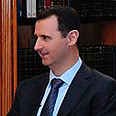
British military scientists have found forensic evidence that chemical weapons have been used in the conflict in Syria, the London based Times newspaper reported on Saturday.
A soil sample thought to have been taken from an area close to Damascus and smuggled back to Britain has provided proof that "some kind of chemical weapon" had been fired, it quoted defence sources as saying.
Related stories:
- Opposition: Syrian forces fire chemical weapons
- Chemical attack in north Syria: 'People fell dead'
- Report: Rebels 2 km from Assad's largest WMD cache
The tests were carried out at the British Ministry of Defence's chemical and biological research establishment at Porton Down, it added in the front-page story.
Diplomats at the United Nations said on Thursday that western nations have "hard evidence" that chemical weapons have been used at least once in the Syrian war, without giving details.
The British team were unable to discern whether the weapons had been fired by President Bashar Assad's regime or by the rebels fighting him, nor could they say if there had been widespread use, The Times said.
It cited an unnamed source as saying: "There have been some reports that it was just a strong riot-control agent but this is not the case - it's something else, although it can't definitively be said to be sarin nerve agent."
The British Ministry of Defence had no comment when contacted by the press, although the Foreign Office said it was deeply concerned about the possible use of chemical weapons.
"We are deeply concerned about multiple reports alleging the use of chemical weapons in Syria," a spokesman said.
"We have shared our concerns with the UN secretary general and fully support his decision to investigate.
"The use of chemical weapons would be a horrific crime. Those who order the use of chemical weapons, and those who participate in their use, will be brought to account."
Assad's government has asked the United Nations to investigate its claims that opposition rebels fired a chemical weapon shell in Aleppo province on March 19.
In response, the UN assembled a team of international experts, led by Ake Sellstrom of Sweden, in the region.
But Syrian Foreign Minister Walid Muallem wrote to UN chief Ban Ki-moon this week saying the government could not accept an inquiry that extended to claims against its own forces.
AFP contributed to this report
- Receive Ynetnews updates
directly to your desktop















